How to enjoy the summer without damaging the planet
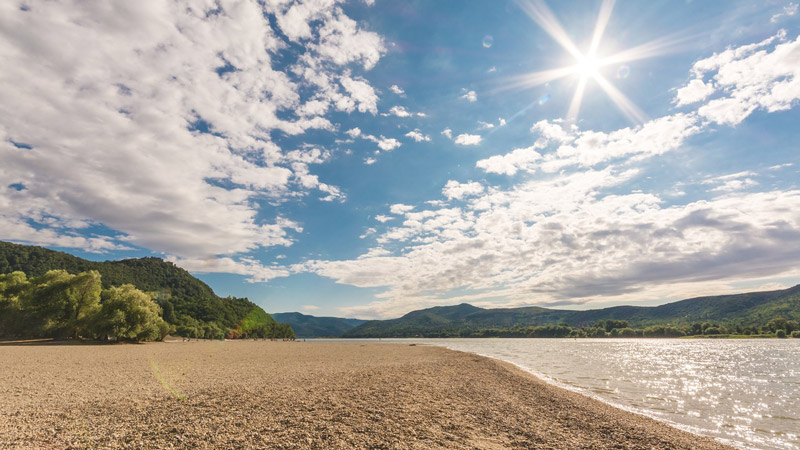
Climate champion Beth has been thinking of ways to enjoy the summer without damaging the world we live in. Here are her top tips.
With everyone enjoying the summer months it is easy to forget the small things that we are doing to cause damage to the planet. Whether you are out with friends, at a festival or jetting off somewhere far away, there are ways to enjoy the summer months and reduce your carbon footprint. You can enjoy the summer season and help save the planet one small step at a time.
These tips should help you make the most of summer but also advise you to enjoy the season with simple hacks that can make this world an even better place.
Got a tip of you own? Tell us on twitter
Top tips for an Eco friendly summer
1. Reduce plastic waste
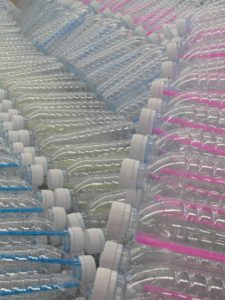
With Britain experiencing its hottest summer for years, everyone is heading to the nearest park or beach for a picnic. Why not reduce the amount of plastic you waste, whilst enjoying yourselves? Try packing reusable cutlery and plates or even use reusable containers to pack your food in instead of disposable ones. Instead of constantly buying a bottle of water, be more prepared and bring your own reusable bottle. Many areas have water fountains to refill at, and cafes and restaurants will happily refill your bottle with tap water if you ask.
2. Walk or Cycle
Think about your mode of transport! Although it is hard to stay “green” when you’re going on holiday aboard, it can still be done. Instead of jumping on the local bus or grabbing a taxi, a great way to experience your new surrounds and help reduce carbon emissions is by walking or hiring a bike. You may even explore areas you never thought of by traveling this way. It is another way to truly appreciate our own natural surroundings and all the real beauty the world has to offer!
Serious about stopping climate change? Join our delegation to the UN climate summit in 2018
3. Buy in season vegetable or fruits
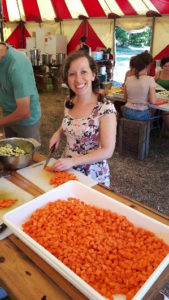
Try the local cuisine! This is one of the best things about visiting somewhere new and fully immerse your self in the culture. By trying the local cuisine, it is mostly likely that you will be trying the local produce, therefore it wont have had far to travel. This can also be done if you’re staying home this summer too! Mainly trying to shop what is in season and make the most of our own crops! Or why not even baking up a storm for your family and friends with your own local and fresh seasonal produce.
Up for a challenge? Try these bonus tips!
CAFOD’s Collette Byrne attended a sustainability camp in Belgium and picked up some tips of her own! Check them out below.
4. Don’t waste food – get creative!
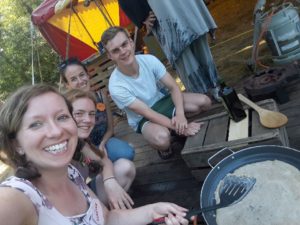
We had a session with Fruitopia, a Belgian not for profit initiative who raise awareness about food waste, and promote sustainable food and consumption. A bit like an episode of ‘Ready, Steady, Cook’, they gave us a bag of ingredients and asked us to cook something! We had a few basics… milk, eggs, bread, fruit. We decided that we would experiment with grinding down the bread to make flour and make fruit pancakes! They tasted much better than they looked, I can assure you!
The idea of the workshop was to make us think outside the box before throwing away food. Apparently, bread is one of the world’s most wasted foods due to demand for fresh bread, high quality standards etc. So before you throw away your stale bread…think to yourself…is there something else I could make with this? Their suggestions were pancakes or French toast!
Read about how we campaign on climate change
5. Build an insect house
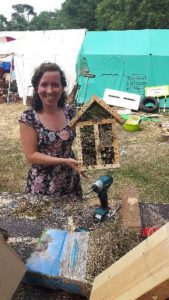
My favourite workshop of all was challenging myself to use power tools I have never touched before in my life, and learning new DIY skills to build an insect house! In our society today, we use so many cleaning products, we replace grass gardens with flagged surfaces, we cut down trees, and dig up fields and parks to build houses… the more this happens, the less opportunities we are giving to God’s smallest creatures on our planet to live their lives too. And we rely on these creatures to survive too, so we really should take care of them.
We built insect houses to put in our own gardens to invite insects to move in and make themselves at home. Made from wood, the house is stuffed with grass and twigs, ideal hiding places for insects, as well as holes in different sizes for bees to lay their eggs. This was really simple to do, and you can do it too!